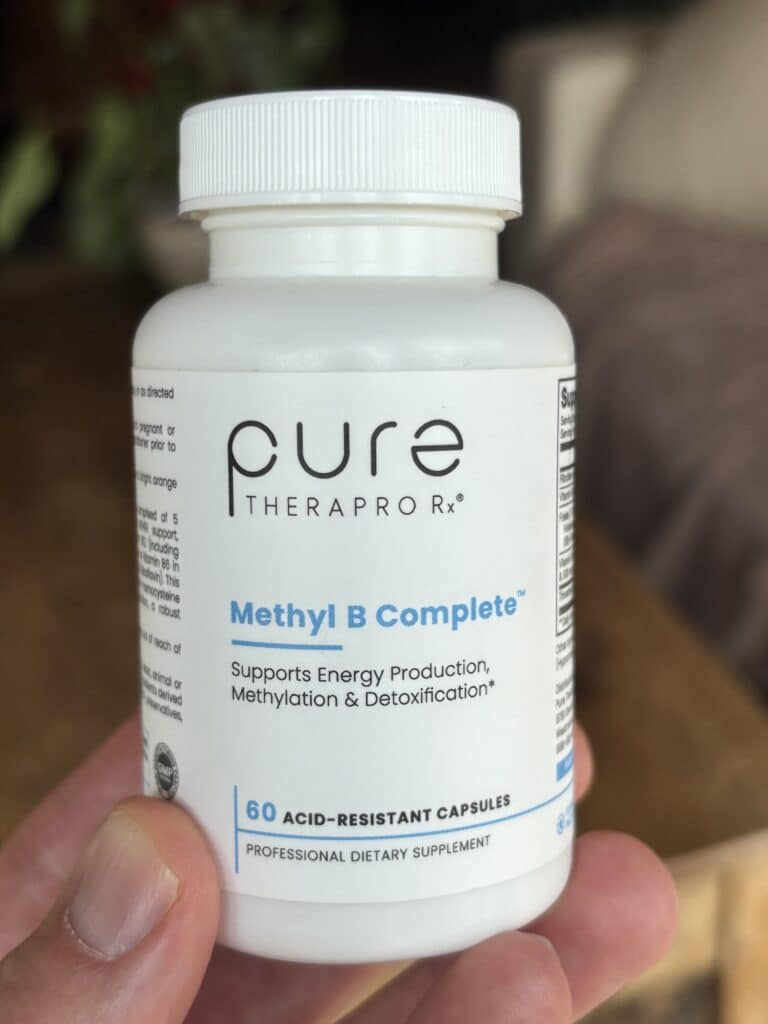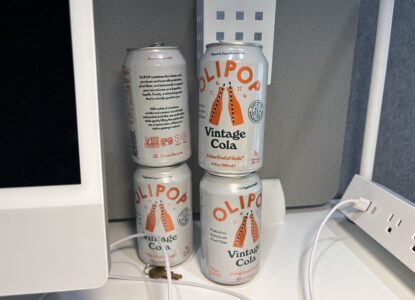The Best Methylated B Vitamin Supplements (And When to Take Them)
Article at a Glance
- In many cases, the best strategy is not to take methylated B vitamins.
- If you do take a methylated B vitamin, look for products that are manufactured in the USA in an NSF/GMP-certified and FDA-inspected facility.
- Always start with small doses, choosing products that are in liquid form or tablets you can split.
- Standing alone, common “mutations” like MTHFR A1298C are not a reason to start taking a high dose methylated B vitamin.
Genes Mentioned

Contents
At Gene Food, we get a lot of questions from our user base about methylation and methylated B vitamins. For good, and bad, influencers like Gary Brecka have put a spotlight on this issue lately and it’s confused people. Exhibit A is Reddit where thread after thread hyper focuses on the impact of genes like MTHFR and COMT.
This blog post is first and foremost for our users. Many of you have asked for input on the best supplements to address MTHFR and methylation more broadly, and we finally have a post live on the site. If you haven’t yet heard of Gene Food and what we do, start here for an introduction.
Genetic polymorphisms, or SNPs, can have a huge impact on B vitamin levels and activity in the body, but high-dose supplements aren’t always a good idea and can cause major side effects if not treated with respect.
In other words, no matter what you hear on the internet, don’t go rushing out and start taking a methylated B vitamin supplement until after you speak with a knowledgable physician.
When B vitamin supplementation is warranted, it’s important to know that not all supplements are methylated, even some of the ones advertised as such.
Below, we offer our recommendations for the best methylated B vitamins, with flexible dosing. First, though, a quick overview of methylation and genetic polymorphisms that impact the pathway.
Methylation and B Vitamins
Methylation influences gene expression, DNA repair, detoxification, and neurotransmitter synthesis. The body’s primary methyl donor is S-adenosylmethionine (SAMe). To stay on top of SAMe production, your body needs sufficient levels of:

Get Started With Personalized Nutrition
Gene Food uses a proprietary algorithm to divide people into one of twenty diet types based on genetics. We score for cholesterol and sterol hyperabsorption, MTHFR status, histamine clearance, carbohydrate tolerance, and more. Where do you fit?
- Folate (B9)
- Riboflavin (B2)
- Cobalamin (B12)
- Pyridoxine (B6).
Here’s what these nutrients do in the methylation cycle:
| Nutrient | Active form(s) | Used for |
|---|---|---|
| Folate (B9) | Tetrahydrofolate, 5-methyltetrahydrofolate (5-MTHF) | Donates a methyl group for the conversion of homocysteine to methionine |
| Cobalamin (B12) | Methylcobalamin | Acts as a cofactor for methionine synthase, catalyzing the conversion of homocysteine to methionine |
| Pyridoxine (B6) | Pyridoxal 5′-phosphate (PLP / P5P) | Involved in the transsulfuration pathway, converting homocysteine to cystathionine |
| Riboflavin (B2) | Flavin adenine dinucleotide (FAD) and flavin mononucleotide (FMN) | Act as cofactors for the MTHFR enzyme, which is essential for producing 5-MTHF |
What Affects Methylation
Methylation is key to good health, but it can be compromised by:
- Inadequate intake of folate, B12, B6, and B2 – especially in individuals with certain polymorphisms
- Lifestyle factors, such as smoking, alcohol, and stress
- Epigenetic factors, where genetic variation, diet, and environmental exposures work together to affect disease risk and gene expression
- Genetic variations, especially in MTHFR, MTR, MTRR, and CBS.
Knowing your risk factors across these areas helps inform your decision to supplement with B vitamins, as well as the dose and frequency of any such supplements.

Get Started With Personalized Nutrition
Gene Food uses a proprietary algorithm to divide people into one of twenty diet types based on genetics. We score for cholesterol and sterol hyperabsorption, MTHFR status, histamine clearance, carbohydrate tolerance, and more. Where do you fit?
Genetic Variations Affecting Methylation
Although our scoring model at Gene Food tests for 15 SNPs that affect methylation, we will keep things simple for this post and say there are four main genes involved in methylation which are known to be affected by altered B vitamin status. The precise impact of these polymorphisms is still under investigation, but here’s a summary of what we know so far.
| Gene | B Vitamin(s) Involved | Common Polymorphisms | Methylation Effects | Clinical Relevance |
|---|---|---|---|---|
| MTHFR | Folate (B9), B2 | C677T, A1298C | Can reduce 5-MTHF and impair methylation | Can increase homocysteine, thus increasing disease risk |
| MTR | B12 | 2756A>G | Impairs the conversion of homocysteine to methionine | Can decrease methylation and increase homocysteine |
| MTRR | B12 | 66A>G | Impairs enzyme regeneration | Can decrease methylation and increase homocysteine |
| CBS | B6 | rs2850146, others | Alters homocysteine metabolism | Can negatively impact detoxification processes and increase sulfur load |
MTHFR and Methylation
MTHFR stands for methylenetetrahydrofolate reductase, which is an enzyme heavily involved in donating methyl groups and converting homocysteine to methionine. Genetic variations that affect MTHFR metabolism can, therefore, have an outsize impact on disease risk related to elevated homocysteine.
Common polymorphisms affecting MTHFR include C677T and A1298C. In theory, these both reduce MTHFR enzyme activity, leading to decreased 5-MTHF production and impaired methylation.
However, research increasingly suggests that C677T is the primary driver of reduced red blood cell folate, and that A1298C is not independently associated with reduce MTHFR activity.
Here’s why the two polymorphisms have a different degree of impact:
The impact of C677T
The C677T polymorphism reduces MTHFR enzyme activity and increases the “thermolability” of MTHFR. In turn, this leads to a decrease in 5-MTHF and an increase in accumulated 5,10-MTHF substrate.
The upshot: Higher plasma homocysteine levels in (homozygous) folks with two copies of the C677T variant, and higher levels too in (heterozygous) folks with one copy (compared to those without the variant).
The impact of A1298C
The A1298C polymorphism also reduces the activity of the MTHFR enzyme but does not affect its thermolability. The resulting impact of this polymorphism is inconsistent.
The upshot: In many cases, there’s little noticeable effect of A1298C on red blood cell folate, MTHFR activity, and homocysteine levels. However, where folate levels are very low, this polymorphism is important and can contribute to elevated homocysteine.
Understanding the underlying mechanisms at work with these variants helps explain why some studies have found an association between A1298C and vascular disease, pregnancy loss, and neurological diseases, while others haven’t.
All of this to say, don’t go out and buy high-dose B vitamins on the basis of an A1298C polymorphism. Chances are, unless you’re highly folate deficient, it’s having little impact on methylation.
If, however, you have at least one C677T copy, a methylated B vitamin complex is typically a good insurance policy. With the caveat that high doses aren’t necessarily best.

Get Started With Personalized Nutrition
Gene Food uses a proprietary algorithm to divide people into one of twenty diet types based on genetics. We score for cholesterol and sterol hyperabsorption, MTHFR status, histamine clearance, carbohydrate tolerance, and more. Where do you fit?
High-Dose B Vitamin Side Effects
B vitamins are essential, but you can definitely have too much of a good thing when it comes to B vits.
Yes, these nutrients are (mostly) water soluble, and your body will just flush them out as needed. However, taking high doses of B vitamins, especially regularly, can cause a range of side effects.
| B Vitamin | What’s Considered a High Dose | Potential Side Effects |
|---|---|---|
| Pyridoxine (B6) | More than 100 mg daily, especially long term | Nerve damage, peripheral neuropathy (tingling, numbness, or pain in hands and feet)Painful skin lesionsPhotosensitivityNauseaHeartburn |
| Niacin, Nicotinic Acid (B3) | More than 1,000 mg daily, especially sustained release forms | Facial flushingLiver toxicity, hepatitis, liver failureNausea and vomitingHigh blood sugarLow blood pressureFatigueHeadaches Rashes |
| Folic Acid (B9) | More than 1,000 mcg daily | Can mask B12 deficiency, leading to irreversible nerve damageDigestive upset, nausea, and bloating |
| Cobalamin (B12) | Very high doses (especially as injections) – more than 2,000 mcg daily | Rarely, can lead to::Heart palpitationsBlood clotsKidney dysfunction, especially with pre-existing kidney disease |
Factors to consider
So, you got your genetic report back and see flags for C677T or A1298C. Or, maybe you’ve got high homocysteine and figure a B vitamin is a good idea.
First, check in with your (hopefully knowledgeable) doctor.
Second, see the above summary of why A1298C isn’t always a prescription for supplemental B vits.
Assuming a B complex is a good approach for you, here’s what to look out for when choosing a genuinely methylated B vitamin complex.
- Flexible dosing
- Tablets that you can split
- Liquid formulas
- Lower dose capsules or softgels
- Third-party certification
- Good Manufacturing Practices (GMP) at minimum
- NSF certification
- FDA or Health Canada certified
- Comprehensive formula with methylated form
- Formulas containing B2, B6, B9, and B12 to support methylation
- Methylcobalamin (B12) – look for MecobalActive®, a patented, lab-verified form
- 5-MTHF (B9) – look for Quatrefolic®, a patented, lab-verified methylfolate.
Note that ConsumerLab and other independent reviewers have found that some B complex supplements from lesser-known brands don’t always provide the labeled dose and can contain impurities. In general, though, well-established brands typically conform to their label claims and are free from contaminants.
Our top choices
Pure TheraPro Rx Methyl Active B™
- Full spectrum B complex
- Lower dose per capsule, for easy flexible dosing
- Provides both MecobalActive® and Quatrefolic®
- Free of gluten, soy, dairy, GMOs, and artificial additives
- Also includes choline and trimethylglycine (TMG) to support methylation
- Manufactured in the USA in an NSF/GMP-certified and FDA-inspected facility.
Patient One Formulas B-Complex with Quatrefolic®
- Mid-range potency for flexible dosing
- Full B complex
- Includes Quatrefolic®
- Provides B12 as methylcobalamin
- Company also offers standalone Quatrefolic and liquid methylcobalamin.
Bioclinic Naturals Active B Complex
- Full B complex, including active riboflavin 5’-phosphate (B2) and pyridoxal 5’-phosphate (B6)
- Includes Quatrefolic® and methylocobalamin
- Low to mid range potency for flexible dosing
- Vegan-friendly.
Alternative options
You might also want to consider Codeage Methylfolate B Complex+ formula for mid-range, flexible dosing.
Every capsule provides::
- 680 mcg of Quatrefolic® in each capsule
- 15 mg Riboflavin 5’-Phosphate (B2)
- 7.5 mg of vitamin B6
- 500 mcg of methylcobalamin (B12)
- 300 mg of betaine (trimethylglycine TMG)
This formula is:
- Vegan, non-GMO, dairy, soy, and gluten-free
- Manufactured in the USA in a cGMP-certified facility
- Certified by Health Canada (NPN: 80117454).
Finally, if you’re looking for a very high dose formula to support methylation, consider Methyl B Complete™ from Pure Thera.
This formula will be much too potent for most individuals and should be used with caution and under the care of a physician.
Each capsule provides:
- 25 mg of riboflavin 5′-phosphate sodium (B2)
- 15 mg of pyridoxal 5′-phosphate (B6)
- 3,400 mcg of folate
- 1,700 mcg DFE as Calcium Folinate
- 1,700 mcg DFE as Quatrefolic®)
- 1,000 mcg of B12
- 500 mcg as adenosylcobalamin
- 500 mcg as methylcobalamin
- 650 mg TrimethylgIycine (TMG).
The complex is manufactured in the USA in a GMP/NSF certified facility.
Final thoughts
If you’re in the market for a B complex to support methylation processes, don’t just reach for any old formula. Many supplements contain doses significantly higher than recommended intakes, with little additional benefit and, in some cases, a greater risk of side effects.
Lower potency formulas with the active forms of B vitamins are typically best. That way, you know you’re getting what you pay for, and you can tailor the dose to your needs. If you’re able to work with a healthcare practitioner to keep track of homocysteine levels, red blood cell folate, and other biomarkers, consider starting with a dose closer to the RDI. That may well be all you need to overcome any methylation challenges wrought by a heterozygous polymorphism.

Get Started With Personalized Nutrition
Gene Food uses a proprietary algorithm to divide people into one of twenty diet types based on genetics. We score for cholesterol and sterol hyperabsorption, MTHFR status, histamine clearance, carbohydrate tolerance, and more. Where do you fit?



